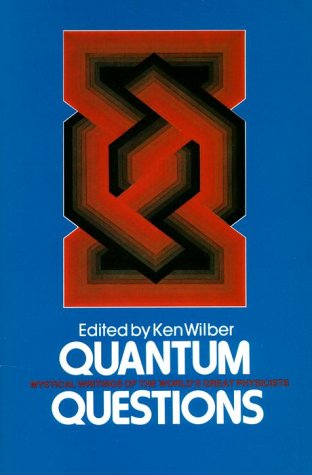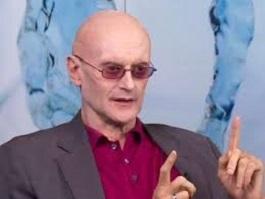Quantum Questions: Mystical Writings of the World’s Great Physicists.

Edited by Ken Wilber, with the research assistance of Ann Niehaus

ESSAY – By Adi Da Samraj

Varieties of Thinking about Physics and Mysticism
The popular scholar Ken Wilber is a longtime informal student (or appreciative public reader) of My published Teachings, and, as his books often suggest, he especially appreciates My non-reductionist Teachings relative to the inherent singleness of the total (or collective) Great Tradition of mankind, and My comprehensive Teachings (and My systematic evaluation of the Great Tradition) relative to the underlying structure of the Great Tradition as a whole (which underlying structure is the psycho-physically pre-determined pattern of the first six, and inherently ego-based, stages of life-and which pattern can be Completed, or made Whole, only by the only-by-Me Revealed and Given seventh, and Inherently egoless, and Self-Evidently Divine, stage of life).
Ken Wilber’s special scholarly interest is in communicating a comprehensive survey (or a complete analytical summary) of the single Great Tradition of mankind. To this end, Ken Wilber, like Aldous Huxley, makes full use of the scholar’s characteristic talent of being able to assimilate and (as in the case of the book entitled Quantum Questions) to anthologize the various ideas of many disparate individuals and literary sources, and to re-present those ideas in a systematic (and more or less popular) manner, even in order to demonstrate what Aldous Huxley called the “perennial philosophy”. However, because the Great Tradition of mankind is, itself, incomplete (comprising only the first six of the potential seven stages of life), any attempt to summarize the “perennial philosophy” of mankind must, necessarily, be, itself, incomplete (and the “perennial philosophy” is, therefore, something of a myth). Only the only-by-Me Revealed and Given seventh stage of life Completes the Great Tradition of mankind (and, therefore, makes possible a Complete, and, potentially, Most Perfectly ego-transcending, philosophy of life). I (Alone) Am the Completion of the Great Tradition of mankind.
In the book Quantum Questions, Ken Wilber argues that such books as The Tao of Physics and The Dancing Wu Li Masters (which make much of the apparent likenesses, or parallels, between the scientific views of modern physics and the traditional views of mysticism) are reductionistic-that is to say, such books (in Ken Wilber’s view) disregard the inherent difference (or hierarchical distinction) between scientific knowledge (or the language of science) and mystical experience (or the language of mysticism). Ken Wilber’s point of view
in this matter rightly serves to counterbalance the popular tendency to equate Ultimate religious (or Spiritual) Reality with conditional (and also conventional, even if scientific) reality. However, Ken Wilber’s book is not a scientific denial of the validity of mysticism. On the contrary, the book’s principal content consists of the “mystical” writings of the great modern physicists. Therefore, the essential content (and impact) of the book supports the view that there is no contradiction between modern physics and the tradition (or the future) of mysticism.
Does Ken Wilber’s argument demonstrate the utter non-validity of the arguments in books such as The Tao of Physics and The Dancing Wu Li Masters? It depends on your point of view. Such books as The Tao of Physics and The Dancing Wu Li Masters do develop a positive (and not utterly unworthy or unjustified) mystical feeling about the implications of modern physics. Indeed, such books are themselves expressions of a kind of mystical thinking. And even though Ken Wilber’s argument clearly calls for a critical and discriminative reading of books that equate (or even parallel) physics and mysticism, he does not call for an end to mysticism (or even mystical thinking) itself. However, as I am sure they would all agree, neither the scientists quoted in Ken Wilber’s book, nor Ken Wilber himself, nor the authors of such books as The Tao of Physics and The Dancing Wu Li Masters are, themselves, great and true mystics (or great and true Realizers of the advanced or the ultimate stages of life). Generally speaking, both the “science” and the “mysticism” of scientists and scholars are, themselves, merely and entirely exercises of the conventions of verbal thought, within the inherently egoic context of the first three stages of life. (Therefore, even the “mysticism” of scientists and scholars is a pre-mystical occupation, dominated by left-brained analytical tendencies of mind.)
Indeed, the entire controversy between science and religion (or mysticism) is itself a kind of (now traditional) language game, played out between two opposing analytical (or conceptual) minds (even within the same individual). One of those minds tends to exaggerate objective, left-brained, and yang-like differences, and the other tends to exaggerate subjective, right-brained, and yin-like unities. Even though both unity and “difference”, so described, are somehow (if only temporarily) correct (according to the mind that proposes them), the controversy (or the psychological and self-contradictory ego-dilemma) cannot come to an end until double-mindedness is, itself, transcended (in the peace of non-duality-beyond the ego-mind).
Ken Wilber argues that the resolution to this particular controversy is in the understanding of science and religion (or mysticism) as equally valid (but hierarchically separate) and non-contradictory propositions. Other scholars argue that the resolution to this same controversy is in the understanding of both science and religion (or mysticism) as an ultimately single proposition (consistent and whole). Both arguments are (arguably) correct, and both arguments are (arguably) insufficient and incomplete, and both arguments are (arguably) wrong. Therefore, not only Quantum Questions but also The Tao of Physics and The Dancing Wu Li Masters (along with a few other books that speculate in a similar manner) are included, by Me, in this essential gathering of literary materials (which I Call The Basket Of Tolerance)-in order to provide a fully inclusive assortment of possibly useful commentaries on the varieties of thinking that may precede (and even provide a kind of doorway to) true religious (and, thus, esoteric, and Really Spiritual) understanding, practice, and Realization.
* * *